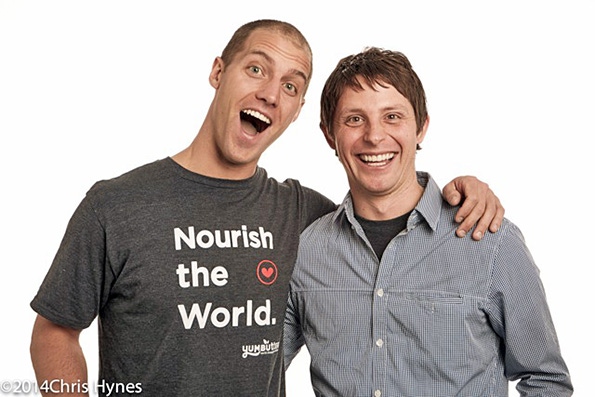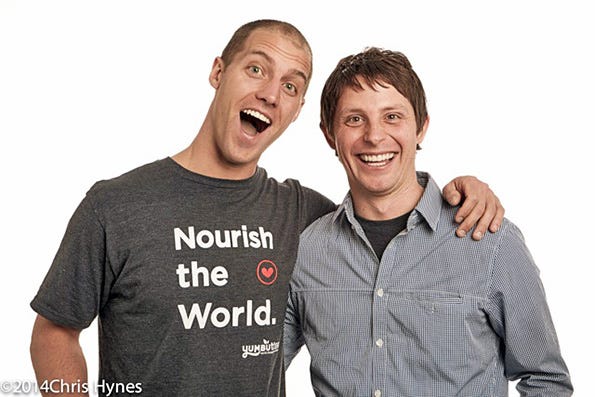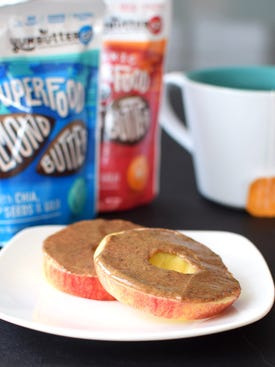Here's a story you can go nuts for! Adrian Reif and Matt D'Amour took their love for out-of-the-box homemade holistic foods and turned it into a successful nut butter business. To learn more from this influential duo we asked them a few questions about where they came from and where they're going.
November 6, 2014


What was the inspiration for your business?
Matt: After spending time at Boulder Outdoor Survival School in the Utah desert, I contracted a severe gastrointestinal issue. It wasn’t diagnosed properly and took a huge physical toll on me. Through some mentors and delving into deeper nutritional study, I realized I could heal it through food and my diet. Through this process of crafting my own holistic foods, I began making uber-nutritious nut butters—far from my childhood staples. As I progressed in my nutritional and kinesiology study, I became a holistic health coach and loved sharing my creations with clients. Naturally, this lead to a desire to create a food company that nourishes people from the inside out and does business compassionately.
Adrian: I began churning homemade peanut butter in 2008 and quickly realized how amazingly delicious it was—better than anything in the store. And I could control what went in it (no nasty oils!). I started experimenting with it the same way I cook: throw in whatever's in the cabinets. Green tea, chocolate, marshmallows, coconut and other oddities. In 2009, when I was trekking towards Mt. Everest Base Camp in Nepal, I spread some spices on my generic peanut butter and crackers and it was one of the most magical combinations I’d ever sank my teeth into. I was also slightly oxygen deprived. When I got back to the States, I set out recreating that spice blend and began selling those early Yumbutter potions at farmers' markets. This was a perfect outlet for my desire to use business to build a better world.
What have been some critical factors on your road to success?
a. Blazing forth like we didn’t know what we’re doing.
b. Following our intuition for business and the future of real food.
c. Asking others for help and advice and building a team of experts.
d. Allowing ourselves to be adventurous and creative; not following any formula or rules
e. Perseverance, perseverance, perseverance! Gotta believe in what we are doing and stick with it.
f. Staying true to our core vision and mission no matter what—nutritious, mouth-rockin', world-changing nut butters.
Describe a mistake you made with your business. How did you fix it?
We started going into distribution here in the Midwest before we were ready for it. We worked with a couple of small, local distributors, but our nut butter potions needed a little more education than the rest and it was challenging to get that story across outside of our home. We slowed down, went back and invigorated our brand, and this time as we expand we’re building a network of brokers, YumBassadors, grassroots support, and some PR buzz.
And we’re taking off!
What’s your best piece of advice for your fellow entrepreneurs?
Take that first step. Don’t wait. Get something into the market and see if people will pay for it. Set a clear vision and do something you’re passionate about and then stick with it!
How has the natural products industry enabled your success?
The industry has been amazing. We connect with other entrepreneurs and veterans of the industry constantly and they continually help us with advice, connections, and more. I’m amazed by the collaborative energy of folks in this space. And customers let us know quickly whether they like what we do or not. Fortunately, the community of customers has let us know how much they resonate with Yumbutter values and mission, which keeps us going every day. Without them, we wouldn’t exist.
Where are you going? What is the vision for your business in 2 years? 5 years? 10 years?
Our vision is to lead the nut butter category in innovation, cutting-edge nutrition, and social and environmental impact. We’re getting so much traction right now—people supporting our mission, our ingredient integrity and taste, and our innovative packaging—that in two years Yumbutter will be the name people think of when they think of the “good for me, good for the Earth” nut butter company.
Is it important for companies to have a (social) mission? What is the inspiration behind "Holistic Responsibility" and your BuyOne:FeedOne program?
We believe that creating a business model without the consideration and benefit for everything and everyone, is simply an outdated one. Business is a powerful tool for positive change, so why not use it that way? It’s our goal to use Yumbutter to create as much good as possible. Holistic Responsibility is the result of asking ourselves the question: “How can a nut butter company improve people’s lives?” We aim to consider our impact on the health and happiness of Yumbutter fans, our supply chain partners, Mother Earth, our employees, the business ecosystem, and people born into unfortunate circumstances.

Has anything surprised you about working with independent retailers?
Independent retailers have been very supportive of us and Yumbutter. One reason is that many of the buyers and managers are world-changing idealists like us, so we have similar values. When we share the Yumbutter story and mission, not to mention our delicious taste and real ingredients, they’re super stoked to get something on the shelf they are passionate about.
How do you position your products in mass, natural and online?
We want people to think: “Eating healthy and doing good can be easy.” We position ourselves as “world-changing nut butters” because we’re obsessive about offering the most nutritious, clean, and mouth-rockin’ nut butters on the planet, in packaging that makes eating healthfully on-the-go super easy. On top of that, we’re creating social and environmental impact: certified organic (with exception of the almonds), it improves the lives of children with malnutrition through our BuyOne:FeedOne program; also, our supply chain is increasingly ethically sourced, and we’re carbon neutral administratively.
(Photo by Chris Hynes Photography)
How do you develop relationships with retailers and educate them about your company's story?
Matt: I head up our sales efforts and love working with retailers and buyers, just chatting with them as real people. I share what we’re up to, our mission to improve people’s lives, all the deliberateness and transparency that goes into it, and try to be my authentic self. And they “get it.” They love our ingredients panel and see the authenticity in our mission.
What most helped market your product in the beginning?
Adrian: In the very beginning, I went to Farmer’s Markets around Madison, Wisconsin—four per week—and had the opportunity share the Yumbutter story and samples. We’re so fortunate to have an amazing community that supported us and spread the word. After that, in-store demos became our greatest asset. We’ve spent hundreds of hours in the chilly aisles of grocery stores handing out samples, sharing our mission, and just connecting with people on a human level. It’s a lot of work, but fun and rewarding, because we’ve been able to share the story and hear about our customers’ lives first hand.
What's a guilty pleasure of yours?
Matt: Three-hour massages once a year on my birthday. Splurging on local kombucha while traveling.
Adrian: A hot coffee after mountain biking, and Luna & Larry’s Coconut Bliss Ice Cream (usually a whole pint).
What's on your iPod right now?
Adrian:Pandora stations curated from Bon Iver (for kitchen time) or Macklemore (GTD time) and podcasts from Tim Ferris, Tara Brach and Michael Stone (meditation teachers).
Matt: Jose Gonzales, Angus and Julia Stone, Jane Winther, Emancipator, PANG, Trevor Hall, Wild Feathers.
Do you have any pet peeves?
Adrian: Airlines.
Matt: Narrow mindedness and dogmatic viewpoints on life.
Give us an inside scoop on yourself.
Matt: In high school, I had 21 different pairs of Chuck Taylors and often wore mix & match colors—one color on the right foot, and a different color on the left foot.
Adrian: I just bought a 300 square foot house (on wheels) and will be trying my hand at living big while living small.
You May Also Like


